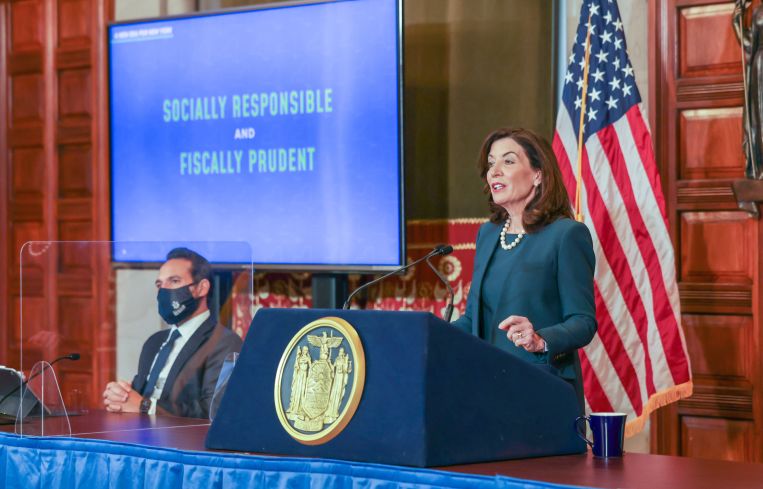Hochul’s $216B Budget Includes $25B for Housing and Property Tax Rebates
By Mark Hallum January 18, 2022 5:18 pm
reprints
New York Gov. Kathy Hochul outlined her administration’s objectives for fiscal year 2023 within the $216 billion executive budget on Tuesday, with plans to invest about $25 billion of that on housing in the state.
Hochul also pitched a number of changes to the way residential space will be used, including a property tax rebate for homeowners, increasing the allowable number of accessory dwelling units (ADU) — small, independent residential units on the same lot of a standalone house — and calling for more funding for the Emergency Rental Assistance Program (ERAP), which on Jan. 15 officially ran out of federal money for New Yorkers impacted by the pandemic.
“At a time when inflation is robbing families of long-awaited gains and income, and recognizing that property taxes are still too high, we will provide a $2 billion property tax rebate to more than 2 million middle-class homeowners,” Hochul said. “We have to confront the housing affordability crisis. And one way we’ll do that is by advancing a new $25 billion, five-year housing plan to create and preserve 100,000 affordable homes, including 10,000 homes with supportive services for vulnerable populations.”
Hochul’s housing moves drew mixed praise from housing advocates and landlord organizations alike, with residents of Nassau and Westchester counties the likeliest to be able to take advantage of Hochul’s plan to boost housing stock by requiring municipalities to allow a minimum of one ADU on owner-occupied residentially zoned lots, according to the Regional Plan Association’s (RPA) senior housing planner Marcel Negret.
More suburban neighborhoods in Staten Island, eastern Queens, the northern Bronx and southern Brooklyn would also be able to build under the proposal, Negret said.
“In [Nassau and Westchester] counties, population growth has outpaced the amount of new housing stock added over the last decade by almost twice that rate,” Negret said. “Senior residents who have a fixed income are a population who has struggled with [supplementing income], so they may have the ability to build an ADU that would also offer them an additional source of income … So that’s one clear target.”
The RPA, along with progressive advocacy group Make the Road New York (MRNY) and AARP, have been vocal supporters of opening the door for more ADUs. Regardless, MRNY said the governor’s proposal did not go far enough in replenishing the Excluded Worker Fund, a one-time $2 billion subsidy for undocumented New Yorkers, and called upon the state legislature to counter this proposal with a one-house budget similar to the Black, Puerto Rican, Hispanic and Asian Legislative Caucus’ People’s Budget released on Monday.
Basic New York State School Tax Relief (STAR) property tax relief exemptions and credit beneficiaries for homeowners with incomes below $250,000 and Enhanced STAR recipients would be eligible for a property tax rebate that would act as an extension of the real Property Tax Relief Credit Program that expired in 2019. This year-long program would yield an average benefit of about $970 for an estimated 2 million households outside of New York City, while about 479,000 could get a benefit of $425.
For homeowners with an income below $75,000, Hochul’s office estimates the statewide average credit could be about $1,050 and reach an estimated 837,800 households.
This benefit will be an advanced credit as opposed to a claim that would be filed with taxes, instead being funneled through 2022 income tax returns and in the pockets of New Yorkers by fall 2022.
“We’re going to do it by taking a fiscally responsible approach because we know that the federal funds will eventually run out and that’s why we’re not banking on them for the future,” Hochul said. “We’re not creating recurring expenses or new programs we can’t pay for. So for the first time ever, with smart planning, New York will have no out-year gaps.”
Community Housing Improvement Program (CHIP), which represents the owners of up to 400,000 units of mostly rent-stabilized housing in New York City, believes that Hochul is on the right track by asking the federal government for $2 billion to replenish ERAP.
“Renters and their housing providers need help that can only come from additional funding to the Emergency Rental Assistance Program (ERAP) and other programs that pay the rent for struggling New Yorkers,” Jay Martin, executive director of CHIP, said in a statement. “Now the state legislature has to follow her lead and make sure the rent relief programs are fully funded so tenants in need are protected. If they don’t, renters in arrears will be put at risk of losing their homes.”
Although the $2 billion for ERAP is included in the budget, it is not clear if Washington legislators will provide the states with the funds to continue the program.
Hochul plans to give the state’s infrastructure a facelift as well with a five-year $32.8 billion capital plan for the state Department of Transportation, not to mention $1.5 billion for SUNY and CUNY and a $25 billion, five-year housing plan to create and preserve 100,000 affordable homes.
Mark Hallum can be reached at mhallum@commercialobserver.com.



